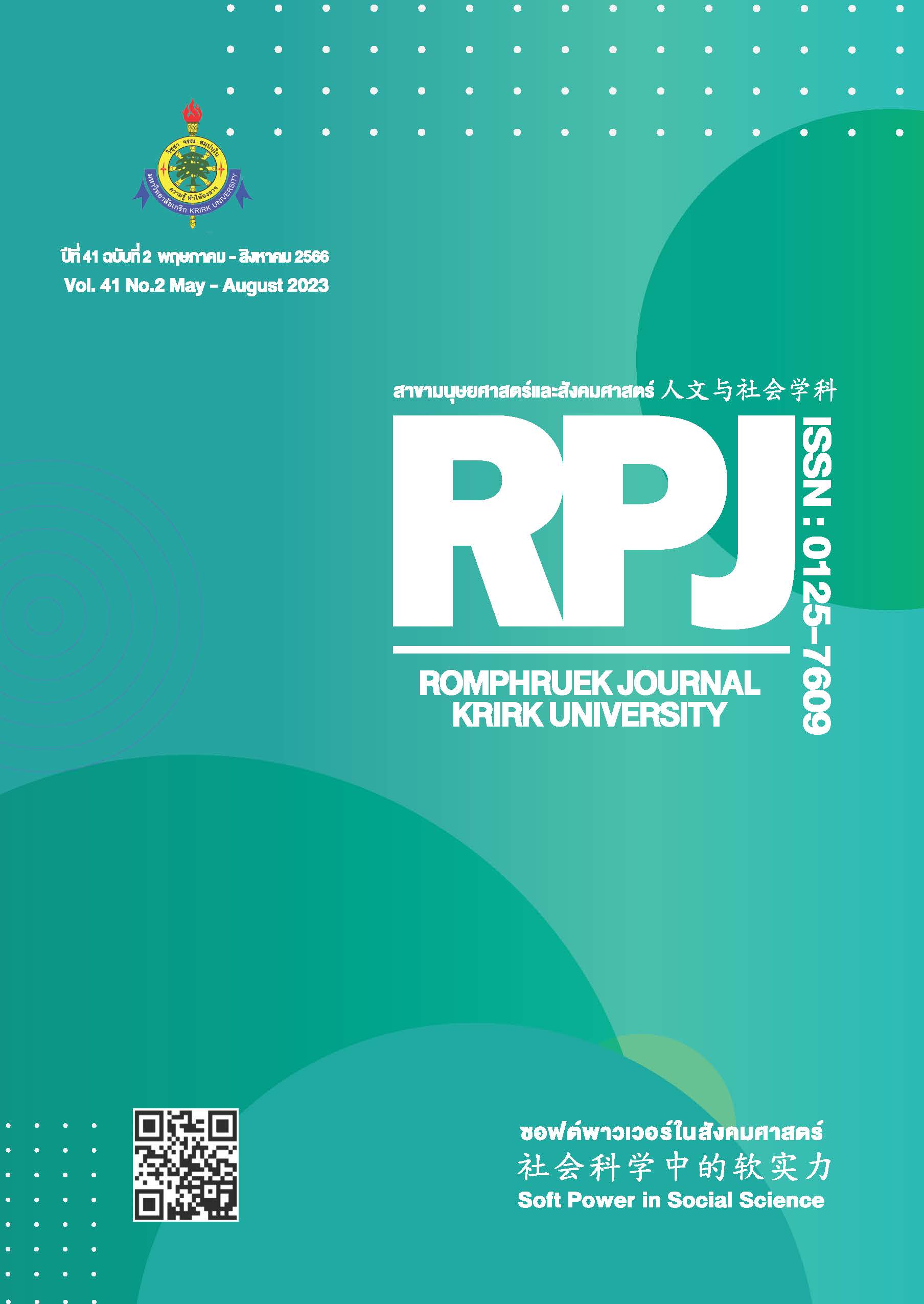ปัจจัยที่เกี่ยวข้องกับความฉลาดทางสังคมของนิสิตระดับปริญญาตรี มหาวิทยาลัยเกษตรศาสตร์ วิทยาเขตกำแพงแสน
Main Article Content
บทคัดย่อ
การวิจัยนี้มีวัตถุประสงค์เพื่อ 1) ศึกษาระดับความฉลาดทางสังคมของนิสิตระดับปริญญาตรี 2) ศึกษาความสัมพันธ์ระหว่างปัจจัยกับความฉลาดทางสังคมของนิสิตระดับปริญญาตรี 3) ศึกษาปัจจัยที่เกี่ยวข้องกับความฉลาดทางสังคมของนิสิตระดับปริญญาตรี มหาวิทยาลัยเกษตรศาสตร์ วิทยาเขตกำแพงแสน ประชากรที่ใช้ในการศึกษา คือ นิสิตระดับปริญญาตรี มหาวิทยาลัยเกษตรศาสตร์ วิทยาเขตกำแพงแสน ชั้นปีที่ 1-4 ปีการศึกษา 2564 จำนวน 8,174 สุ่มกลุ่มตัวอย่างแบบแบ่งกลุ่ม ได้จำนวนตัวอย่างทั้งสิ้น 456 คน ใช้แบบสอบถามออนไลน์ (Google Form) เป็นเครื่องมือในการเก็บข้อมูล การวิเคราะห์ข้อมูลด้วยสถิติเชิงพรรณนา ค่าสัมประสิทธิ์สหสัมพันธ์ของเพียร์สัน และการถดถอยพหุคูณแบบเป็นขั้นตอน เพื่อทำนายตัวแปรความฉลาดทางสังคม
ผลการวิจัย พบว่า 1) ระดับความฉลาดทางสังคมของนิสิตอยู่ในระดับดี 2) ความสัมพันธ์ระหว่างปัจจัยที่เกี่ยวข้องกับความฉลาดทางสังคมพบว่ารูปแบบการเผชิญปัญหา พฤติกรรมการเรียน รูปแบบการเรียนการสอน สัมพันธภาพระหว่างบุคคล การสื่อสาร การมีส่วนร่วมในการเข้าร่วมกิจกรรม และพฤติกรรมเอื้อสังคม มีความสัมพันธ์เชิงบวกในระดับสูงมาก ที่ระดับนัยสำคัญทางสถิติที่ .01 และ 3) ปัจจัยที่เกี่ยวข้องกับความฉลาดทางสังคม พบว่า รูปแบบการเผชิญปัญหา สัมพันธภาพระหว่างบุคคล และพฤติกรรมเอื้อสังคม ที่สามารถทำนายความฉลาดทางสังคมของนิสิตระดับปริญญาตรี มหาวิทยาลัยเกษตรศาสตร์ วิทยาเขตกำแพงแสน ได้ร้อยละ 71.90
Article Details

อนุญาตภายใต้เงื่อนไข Creative Commons Attribution-NonCommercial-NoDerivatives 4.0 International License.
ทุกบทความที่ตีพิมพ์ในวารสารมนุษยศาสตร์และสังคมศาสตร์ร่มพฤกษ์เป็นทัศนะและข้อคิดเห็นของผู้เขียนมิใช่ทัศนะของมหาวิทยาลัยเกริกหรือกองบรรณาธิการ การนำบทความส่วนใดส่วนหนึ่งหรือทั้งหมดไปพิมพ์เผยแพร่ต้องอ้างอิงที่มาให้ชัดเจน
เอกสารอ้างอิง
ดวงใจ วัฒนสินธุ์ และ สิริพิมพ์ ชูปาน. (2562). ปัจจัยที่ทำนายความฉลาดทางสังคมของนักศึกษาพยาบาล. วารสารการพยาบาลและการศึกษา, 12(1), 72-87.
ธีรพัฒน์ วงศ์คุ้มสิน. (2558). ความฉลาดทางสังคมและพฤติกรรมเอื้อต่อสังคมของนิสิตคณะสังคมศาสตร์ มหาวิทยาลัยเกษตรศาสตร์. วารสารสมาคมนักวิจัย, 20(3), 87-98.
ประกายดาว คำป้อม. (2559). ความฉลาดของผู้บริหารสถานศึกษาที่ส่งผลต่อการทำงานเป็นทีมของครูในโรงเรียนประถมศึกษาของรัฐ จังหวัดนครปฐม. คณะครุศาสตร์ มหาวิทยาลัยราชภัฏนครปฐม, นครปฐม.
ปวริศา ภวเจริญผล. (2559). การตรวจสอบกลุ่มตัวแปรความฉลาดทางสังคมที่ทำนายสุขภาพจิตทางบวกของครูในสังกัดสำนักงานเขตพื้นที่การศึกษาประถมศึกษาในจังหวัดปราจีนบุรี. วิทยาลัยวิทยาการวิจัยและวิทยาการปัญญา มหาวิทยาลัยบูรพา, ชลบุรี.
ผ่องพรรณ ตรัยมงคลกูล และสุภาพ ฉัตราภรณ์. (2555). การออกแบบการวิจัย. พิมพ์ครั้งที่ 7. กรุงเทพฯ: มหาวิทยาลัยเกษตรศาสตร์.
ผ่องพรรณ ภะโว. (2562). ปัจจัยทำนายความฉลาดทางสังคมของนักศึกษาพยาบาล. วารสารวิจัยและนวัตกรรมทางสุขภาพ, 2(1), 208-218.
ภัทริณี คงชู. (2561). ปัจจัยเชิงสาเหตุพหุระดับที่ส่งผลต่อความฉลาดทางสังคมของนักศึกษาครู. คณะศึกษาศาสตร์ มหาวิทยาลัยบูรพา, ชลบุรี.
ศิริญพร บุสหงษ์. (2561). ปัจจัยที่มีความสัมพันธ์กับความฉลาดทางสังคมของนักศึกษาพยาบาล. สาขาการพยาบาลสุขภาพจิตและจิตเวช คณะพยาบาลศาสตร์ มหาวิทยาลัยบูรพา, ชลบุรี.
สาคร เพ็ชรสีม่วง. (2561). การพัฒนาแบบวัดความฉลาดทางสังคมสำหรับนักเรียนมัธยมศึกษาตอนต้น โรงเรียนกีฬา: การทดสอบความไม่แปรเปลี่ยนของการวัดตามตัวแปรเพศ. คณะศึกษาศาสตร์ มหาวิทยาลัยบูรพา, ชลบุรี.
สำนักงานคณะกรรมการพัฒนาการเศรษฐกิจและสังคมแห่งชาติ. (2561). ยุทธศาสตร์ชาติ ระยะ 20 ปี พ.ศ. 2561-2580. กรุงเทพฯ : สำนักงานคณะกรรมการพัฒนาการเศรษฐกิจและสังคมแห่งชาติ.
Bandura, A. (1989). Social Foundations of Thought and Action: A Social Cognitive Theory. New Jersey: Prentice –Hall.
Eisenberg, N. F., R. A. (1998). Prosocial Development. In W. Damon, (Ed.), Handbook of Child Psychology: Social, Emotional, and Personality Development. New York: Wiley.
Gardner, H. (1983). Frames of Mind: The Theory of Multiple Intelligences. New York: Basic Books.
Goleman, D. (2006). Social Intelligence. London: The Random House Group Limited.
Lazarus, R. S., & Folkman, S. (1984). Stress, Appraisal, and Coping. New York: Springe
Schultz, W. C. (1958). FIRO: A Three-dimensional Theory of Interpersonal Behavior. New York: Rinehart.


